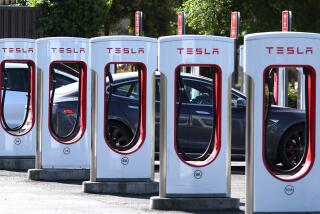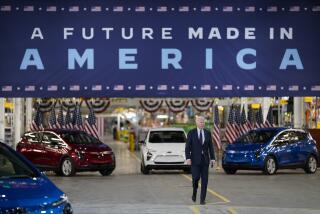Capitol Journal: Whatever road is taken for highway funds, there’s a need for speed
Fuel-efficient cars are great for the air and the planet. But they’re lousy for our highways, especially those battery-powered vehicles. Let me remind you why.
The more gasoline we buy, the more gas tax we pay. And it’s the gas tax that funds road repairs, smoothing the pavement and filling those jarring potholes.
We’ve been pumping fewer and fewer gallons of gasoline per vehicle over the years, and our roads are showing it. California has about the worst pavement in the nation — 48th by one study — and it’s because gas tax revenue has tanked.
Roads don’t care whether a vehicle is a gas guzzler or running on a battery, compressed natural gas or hydrogen. The automobile does the same damage to pavement.
Twenty years ago the average U.S. car got 20 miles per gallon. Today it gets 35. Gov. Jerry Brown’s budget proposal estimates that gas tax revenue will decline by roughly $1.2 billion between 2014 and 2016. Meanwhile, 33 million vehicles are pounding the roads.
It’s complicated, but California’s state gas tax is basically 36 cents per gallon. Roughly half of that feeds the kitty for repair and maintenance of highways. That 18-cent tab was set in the early 1990s and never indexed for inflation, so today its buying power is only 11 cents.
Obviously the solution is not to build more gas guzzlers so we pump more fuel. That would foul the air, hasten the polar ice-cap melt and make us more dependent on foreign oil.
The political push is in the opposite direction. Brown last month announced an ambitious goal of reducing petroleum use in cars and trucks by 50% in the next 15 years.
And Senate leader Kevin de León (D-Los Angeles) introduced a package of climate change bills Tuesday that included the governor’s goal of cutting petroleum consumption in half.
“We need to move the state away from fossil fuels,” De León declared.
Right. So the solution to funding highway repair is to find another source of money.
While Brown was calling in his State of the State address for less gas use, he also mentioned that it was important to have our “roads, highways and bridges in good enough shape to get people and commerce to where they need to go.”
“It is estimated that our state has accumulated $59 billion in needed upkeep and maintenance,” Brown said. “Each year we fall further and further behind. And we must do something about it.”
But he didn’t say what.
There’s a lot of head-scratching in California’s capital and many other states that face the same dilemma.
Clearly we’re headed toward charging a mileage fee — the more you drive, the more tax you pay and the more money is raised to mitigate your driving damage.
But exactly how government collects that mileage fee is the puzzle.
“The idea is to develop a system that doesn’t freak out people,” says John Casey, spokesman for Assembly Speaker Toni Atkins (D-San Diego).
There are several vague ideas: Put a black box — a GPS-type device — in the vehicle that records mileage and tacks on a fee at the gas pump. Or, when the car is serviced, simply have the shop electronically inform the DMV of the odometer reading. Makes sense.
The worst suggestion: Allow the motorist to voluntarily report his mileage as he already does when signing up for insurance. Yeah, right! Like reporting income to the IRS without a W-2 form.
Oregon is experimenting with a pilot project that charges motorists 1.5 cents per mile while rebating the gas tax.
“The average driver pays just $368 annually in gasoline taxes, including all state, local and federal taxes,” according to a recent report by the California State Transportation Agency. “Yet consumers would likely be surprised to find that [is] only about one-third the cost of their cable bill. This lack of perspective makes it very difficult to engage in any conversation about paying for infrastructure.”
A huge commission of politicians, bureaucrats and “stakeholders” — interest groups — is mulling all this. And legislation last year mandated a “road usage charge” pilot program.
But government moves at its own agonizingly slow speed. A report isn’t due until mid-2018.
Atkins introduced legislation last week aimed at raising new money much sooner. She’d steer away from a mileage charge for now and invoke a flat $52 annual fee. Possibly it could be tweaked based on a vehicle’s weight. She estimates this would raise $800 million annually.
She’d also generate $1 billion by spending truck weight fees on highway repair, as they originally were intended. Capitol politicians raided them for the state general fund back when they were using gimmicks to balance the budget.
Atkins says she’s “open to the possibility” of a mileage fee. But she is leery of opposition based on privacy concerns and angry long-distance commuters.
“If someone has another proposal,” she says. “Let them come forward. But we need to be investing in roads now.”
One idea that stops Brown is another bond issue. Half of borrowed money is spent on interest, not roadwork, he notes.
Brian Kelly, Brown’s transportation secretary, says it’s important that “everyone pay their fair share.”
That means a mileage fee. Get ready for it. And we shouldn’t need to wait several years. Sacramento should be pressing the pedal to the metal.
Twitter: @LATimesskelton
More to Read
Sign up for Essential California
The most important California stories and recommendations in your inbox every morning.
You may occasionally receive promotional content from the Los Angeles Times.











